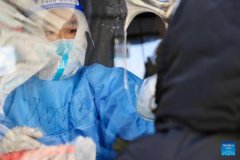Reputation of AstraZeneca's COVID vaccine marred by missteps
AstraZeneca’s release of encouraging data about its coronavirus vaccine from its U.S. trial raised hopes that the drug company could bury doubts about the shot and put a troubled rollout behind it
March 23, 2021, 9:27 AM
6 min read
Share to FacebookShare to TwitterEmail this articleFILE - In this Sunday, March 21, 2021 file photo a vial and syringes of the AstraZeneca COVID-19 vaccine, at the Guru Nanak Gurdwara Sikh temple, on the day the first Vaisakhi Vaccine Clinic is launched, in Luton, England. Results from a U.S. trial of AstraZeneca's COVID-19 vaccine may have used "outdated information," U.S. federal health officials said early Tuesday March 23, 2021. (AP Photo/Alberto Pezzali, File)
LONDON -- AstraZeneca's release Monday of encouraging data about its coronavirus vaccine from its U.S. trial raised hopes that the drug company could bury doubts about the shot and put a troubled rollout behind it. But hours later, U.S. officials issued an unusual statement expressing concerns the company had included “outdated information” from its study and that it may have provided “an incomplete view of the efficacy data.”
A company spokesman said Tuesday it was “looking into it.”
Even before this latest stumble, AstraZeneca had made missteps in reporting data and faced a blood clot scare. Health officials worried that those past issues could cause lasting harm to the shot that is key to global efforts to stop the pandemic and undermine vaccine confidence more broadly.
“The way they handled their data early on, AstraZeneca basically shot themselves in the foot,” Julian Tang, a virologist at the University of Leicester, said even before the latest issue arose. “Even though the new study confirms what we previously thought about the vaccine’s efficacy, people may have lingering doubts,” he said. “Unfortunately, that might mean more people will die of COVID.”
Britain was the first to authorize the vaccine in December, based on partial results from the U.K., Brazil and South Africa. Those results suggested the shot was about 70% effective but were clouded by a manufacturing mistake the researchers didn’t immediately acknowledge. Insufficient data about how well the vaccine protected older people also led some countries including Germany and France to initially restrict its use to younger populations before reversing course.
In the U.S., officials suspended AstraZeneca’s study in 30,000 Americans for an unusual six weeks last fall, as frustrated regulators sought details about neurological problems reported in Britain; ultimately there was no evidence the vaccine was to blame.
But on Monday, the company announced that the shot was about 79% effective in stopping symptomatic COVID-19 — data that Mene Pangalos, head of AstraZeneca’s research and development in biopharmaceuticals, called “much cleaner” than previous releases.
He expressed hope it “puts to bed any doubts.”
Instead, in the early hours of Tuesday, the Data and Safety Monitoring Board experts from the U.S. National Institutes of Health said they were concerned by the information released.
“We urge the company to work with the DSMB to review the efficacy data and ensure the most accurate, up-to-date efficacy data be made public as quickly as possible,” it said.
Even if the company clears up the misunderstanding — and it's not yet clear what the U.S. experts are asking for exactly — it could have a lasting impact.
Tang noted the decades-old controversy over the measles vaccine as a cautionary tale.
“There was absolutely no evidence to prove the (measles, mumps and rubella) vaccine caused autism,” he said. But despite the retraction of the paper that made that claim, Tang said some people still worry about the vaccine. He said AstraZeneca’s issues may be even tougher to overcome “because every week it seems like there’s some new concern.”
Last week, more than a dozen countries temporarily halted their use of the AstraZeneca shot, after reports of rare blood clots in some people who received it. The European Medicines Agency concluded the shot was not responsible, but even though its investigation was standard procedure when unusual side effects are detected, the process inadvertently drew more unwelcome attention to the company.
In Norway, a top official warned on Monday it might not be able to resume its use of the AstraZeneca vaccine because so many people were rejecting it.
“People clearly say that they do not want the AstraZeneca vaccine,” Marte Kvittum Tangen, who heads a Norwegian doctors’ association, told broadcaster NRK.








